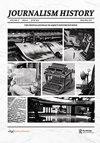Life on Campus: Life Magazine’s “College Girl” as an Ordinary and Ideal Symbol of America in the 1930s
Q4 Social Sciences
引用次数: 0
Abstract
ABSTRACT From its start in 1936, Life magazine offered a portrait of the nation that blended the ideal with the typical through certain kinds of recurring characters. One was “the college girl,” the subject of Life’s first “photo-essay,” a 1937 feature on Vassar students. Such “girls” were more than a curiosity: in this era, women students constituted 40% of college enrollment. This paper analyzes their representation in more than one hundred articles and advertisements published between 1936 and 1941, the magazine’s first five years. It concludes that these characters served as symbols—of regional identity, of American superiority, of Life’s self-proclaimed wholesomeness—yet they also validated the real-life experience of many young women, whose presence in higher education would plummet after the war. One of the most visible media characters of her time, Life’s 1930s “college girl” illuminates a part of women’s history largely forgotten today.校园生活:《生活》杂志的“大学女生”是20世纪30年代美国平凡而理想的象征
自1936年创刊以来,《生活》杂志通过某些反复出现的人物形象,展现了理想与典型的融合。其中一个是《女大学生》(the college girl),这是《生活》杂志1937年第一篇“摄影文章”的主题,拍摄的是瓦萨学院的学生。这样的“女孩”不仅仅是一种好奇:在那个时代,女学生占大学入学人数的40%。本文分析了他们在1936年至1941年(该杂志创刊的头五年)期间发表的一百多篇文章和广告中的表现。它的结论是,这些角色是地区身份、美国优越性和自我宣称的健康生活的象征,但他们也证实了许多年轻女性的现实经历,她们在战后接受高等教育的人数急剧下降。作为她那个时代最引人注目的媒体人物之一,《生活》杂志20世纪30年代的“大学女孩”照亮了一段今天几乎被遗忘的女性历史。
本文章由计算机程序翻译,如有差异,请以英文原文为准。
求助全文
约1分钟内获得全文
求助全文

 求助内容:
求助内容: 应助结果提醒方式:
应助结果提醒方式:


